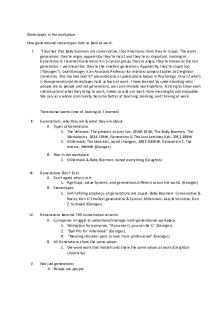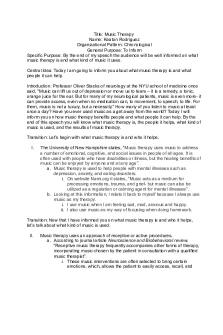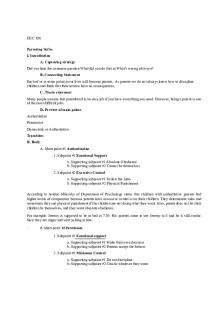Informative speech PDF

| Title | Informative speech |
|---|---|
| Author | Keaton Rodriguez |
| Course | Fundamentals Of Public Communication |
| Institution | Ball State University |
| Pages | 3 |
| File Size | 65.4 KB |
| File Type | |
| Total Downloads | 33 |
| Total Views | 150 |
Summary
Informative speech...
Description
Title: Music Therapy Name: Keaton Rodriguez Organizational Pattern: Chronological General Purpose: To Inform Specific Purpose: By the end of my speech the audience will be well informed on what music therapy is and what kind of music it uses. Central Idea: Today I am going to inform you about what music therapy is and what people it can help. Introduction: Professor Oliver Stacks of neurology at the NYU school of medicine once said, “Music can lift us out of depression or move us to tears – it is a remedy, a tonic, orange juice for the ear. But for many of my neurological patients, music is even more- it can provide access, even when no medication can, to movement, to speech, to life. For them, music is not a luxury, but a necessity.” How many of you listen to music at least once a day? Have you ever used music as a get away from the world? Today I will inform you on how music therapy benefits people and what people it can help. By the end of this speech you will know what music therapy is, the people it helps, what kind of music is used, and the results of music therapy. Transition: Let’s begin with what music therapy is and who it helps. I.
The University of New Hampshire states, “Music therapy uses music to address a number of emotional, cognitive, and social issues in people of all ages. It is often used with people who have disabilities or illness, but the healing benefits of music can be enjoyed by anyone and at any age”. a. Music therapy is used to help people with mental illnesses such as depression, anxiety, and eating disorders. i. On website Nami.org it states, “Music acts as a medium for processing emotions, trauma, and grief- but music can also be utilized as a regulation or calming agent for mental illnesses”. b. Looking at this information, I relate it back to myself because I always use music as my therapy. i. I use music when I am feeling sad, mad, anxious and happy. ii. I also use music as my way of focusing when doing homework.
Transition: Now that I have informed you on what music therapy is and who it helps, let’s talk about what kind of music is used. II.
Music therapy uses an approach of receptive or active procedures. a. According to journal article Neuroscience and Biobehavioral review, “Receptive music therapy frequently accompanies other forms of therapy, incorporating music chosen by the patient in consultation with a qualified music therapist”. i. These music interventions are often selected to bring certain emotions, which, allows the patient to easily access, recall, and
examine memories with the goal of understanding the part the memories play in the patient’s life. b. Later in the paragraph Neuroscience and Behavioral review, talks about what active therapy is: “This second therapeutic form requires the patient, again in conjunction with a trained therapist, to create music and sometimes bodily movements”. i. In active music therapy the patient often times sings along with the music therapist or play an instrument, this too like receptive therapy, relies on the emotional impact of music. c. The difference between receptive and active therapy is receptive music therapy causes the patient to recall pass events, whereas, active music therapy causes the patient to create rather than recall. Transition: Lastly, let’s talk about the results of music therapy. III.
In an article posted march of 2015 by NCBI.gov, they post about the effects on neurological disorders with music therapy. a. On the website they talk about how they did a total of five studies concerning neurological effects and the outcomes of using music therapy. i. The article later stated, “All studies but one reported positive effects of music and MT on outcomes as mood, depression, anxiety, and quality of life”. b. Another article posted February of 2009 by ScienceDirect posted the same results. i. ScienceDirect did a research experiment on a total of 34 patients, examining the effect music therapy would have on anxiety and depression. ii. In conclusion, they reported, “Music therapy enabled a significant improvement in mood, from the first session onwards. Music therapy also led to a significant reduction in anxiety–depression”.
Conclusion: Now that you have been informed of what music therapy is, who it helps, what kind of music is used, and the results, you will be able to understand the power of music in a clinical setting. As Elton John once said, “Music has healing power, it has the ability to take people out of themselves for a few hours”. iii.
Bibliography: Bernatzky, G., Presch, M., Anderson, M., & Panksepp, J. (2011). Emotional foundations of music as a non-pharmacological pain management tool in modern medicine. Neuroscience And Biobehavioral Reviews, 35(9), 1989-1999. doi:10.1016/j.neubiorev.2011.06.005 The effect of music therapy on mood and anxiety–depression: An observational study in institutionalized patients with traumatic brain injury. (2008, November 06). Retrieved February 10, 2018, from https://www.sciencedirect.com/science/article/pii/S0168605408002201 A quote by Oliver Sacks. (n.d.). Retrieved February 10, 2018, from https://www.goodreads.com/quotes/2739-music-can-lift-us-out-of-depression-ormove-us Health & Wellness. (n.d.). Retrieved from https://www.unh.edu/health/ohep/complementaryalternative-healthpractices/music-therap Raglio, A., Attardo, L., Gontero, G., Rollino, S., Groppo, E., & Granieri, E. (2015, March 22). Retrieved February 10, 2018, from https://www.ncbi.nlm.nih.gov/pmc/articles/PMC4369551/ Warren, M. (2016, December 19). The Impact of Music Therapy on Mental Health | NAMI: National Alliance on Mental Illness. Retrieved from https://www.nami.org/Blogs/NAMI-Blog/December-2016/The-Impact-of-MusicTherapy-on-Mental-Health...
Similar Free PDFs

Informative speech
- 4 Pages

Informative Speech
- 3 Pages

Informative speech
- 3 Pages

Informative Speech
- 3 Pages

Informative Speech
- 3 Pages

INFORMATIVE SPEECH
- 6 Pages

Informative Speech
- 3 Pages

Informative Speech
- 8 Pages

Informative Speech
- 5 Pages

Informative speech
- 4 Pages

Informative Speech
- 2 Pages

Informative Speech Outline
- 5 Pages

Informative Speech Rubric
- 3 Pages

Informative Speech Outline
- 5 Pages
Popular Institutions
- Tinajero National High School - Annex
- Politeknik Caltex Riau
- Yokohama City University
- SGT University
- University of Al-Qadisiyah
- Divine Word College of Vigan
- Techniek College Rotterdam
- Universidade de Santiago
- Universiti Teknologi MARA Cawangan Johor Kampus Pasir Gudang
- Poltekkes Kemenkes Yogyakarta
- Baguio City National High School
- Colegio san marcos
- preparatoria uno
- Centro de Bachillerato Tecnológico Industrial y de Servicios No. 107
- Dalian Maritime University
- Quang Trung Secondary School
- Colegio Tecnológico en Informática
- Corporación Regional de Educación Superior
- Grupo CEDVA
- Dar Al Uloom University
- Centro de Estudios Preuniversitarios de la Universidad Nacional de Ingeniería
- 上智大学
- Aakash International School, Nuna Majara
- San Felipe Neri Catholic School
- Kang Chiao International School - New Taipei City
- Misamis Occidental National High School
- Institución Educativa Escuela Normal Juan Ladrilleros
- Kolehiyo ng Pantukan
- Batanes State College
- Instituto Continental
- Sekolah Menengah Kejuruan Kesehatan Kaltara (Tarakan)
- Colegio de La Inmaculada Concepcion - Cebu

